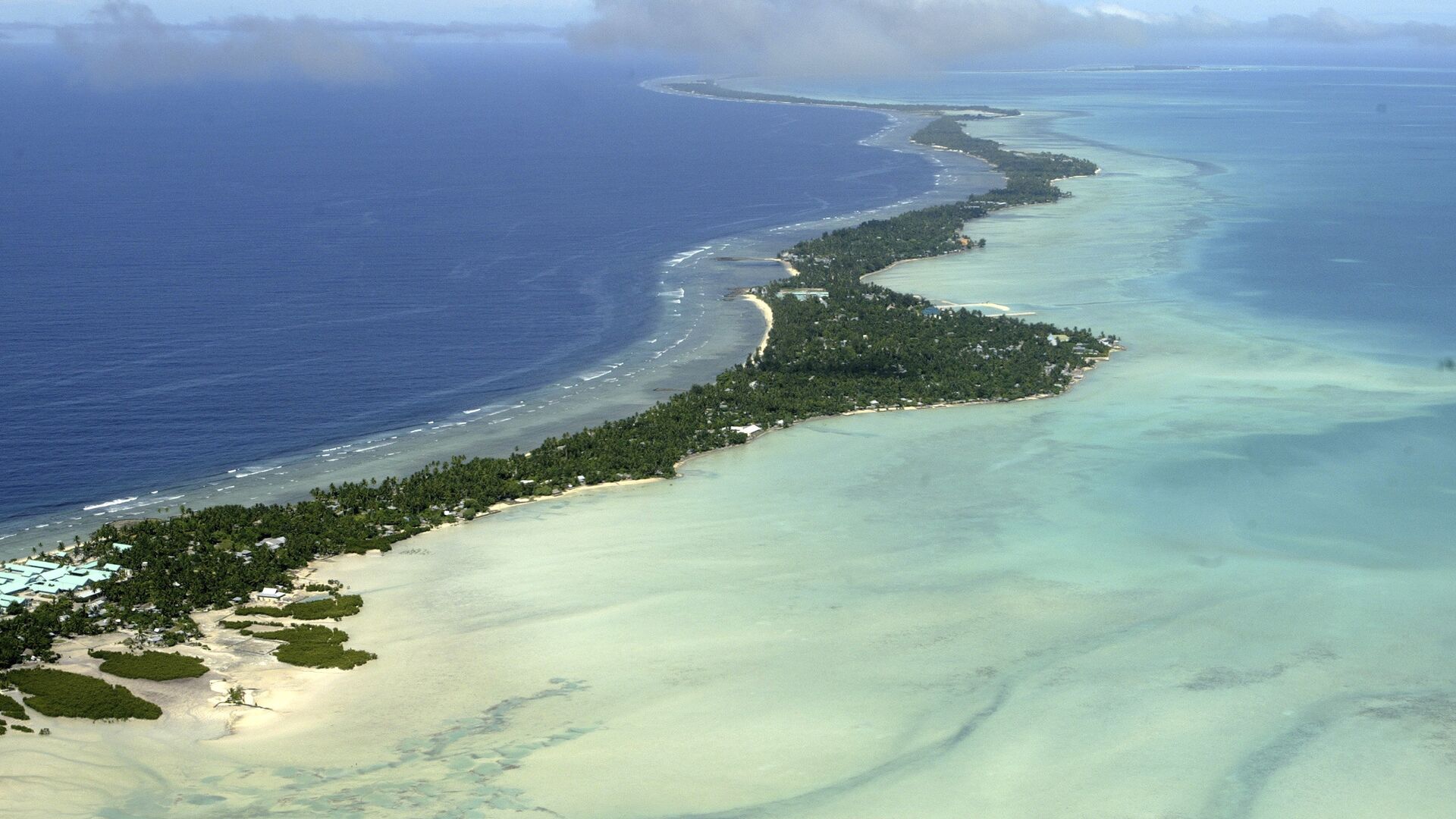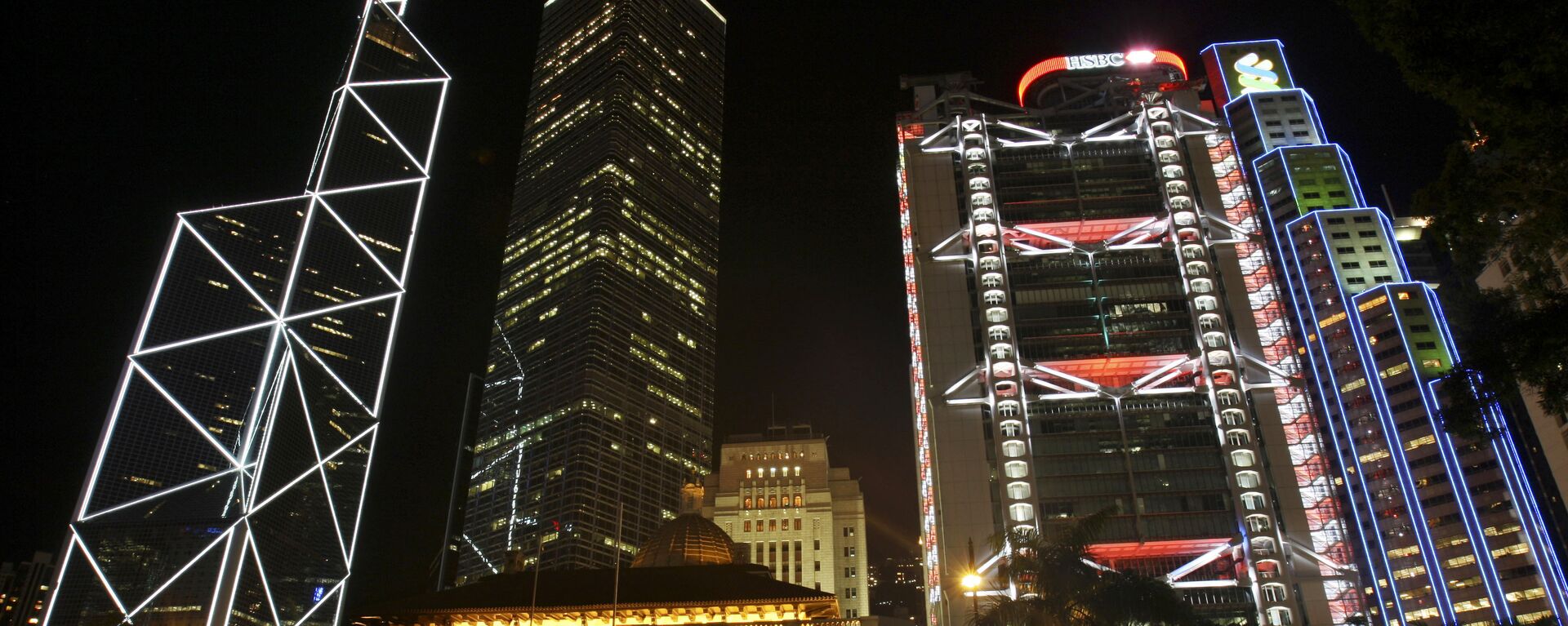https://sputnikglobe.com/20220711/team-china-pacific-nations-start-snubbing-us-allies-as-kiribati-quits-key-bloc-1097181420.html
Team China? Pacific Nations Start Snubbing US Allies as Kiribati Quits Key Bloc
Team China? Pacific Nations Start Snubbing US Allies as Kiribati Quits Key Bloc
Sputnik International
China's increasing involvement with the Pacific island nations, some quite close to the largest US military command in Hawaii, has sent ripples among... 11.07.2022, Sputnik International
2022-07-11T13:02+0000
2022-07-11T13:02+0000
2022-10-19T20:02+0000
pacific
us
china
solomon islands
kiribati
south pacific
australia
new zealand
wang yi
anthony albanese
https://cdn1.img.sputnikglobe.com/img/105047/04/1050470435_0:102:2465:1488_1920x0_80_0_0_5e9ac6539f5bde74ab432eb5cda9e23f.jpg
The remote Pacific island nation of Kiribati has announced its withdrawal from the Pacific Islands Forum (PIF), an inter-governmental organization that aims to enhance cooperation between countries and territories in the region, days after the group committed to unity amid fierce geopolitical rivalry between the US and China.The development deals a blow to the strength of Pacific unity against China, which recently signed trade and security agreements with several South Pacific nations.Kiribati, which switched recognition from Taiwan to China in 2019, decided to withdraw its membership as it contested the extension of the tenure of the current Secretary-General of PIF for a year. It also alleged that other members had exhibited discriminatory behavior against Micronesian countries: the Marshall Islands, Palau, Nauru, and Micronesia, among others.The Pacific Islands Forum brings together Australia, Fiji, the Cook Islands, Kiribati, New Caledonia, French Polynesia, Micronesia, Nauru, New Zealand, Niue, Palau, Papua New Guinea, the Marshall Islands, Samoa, the Solomon Islands, Tonga, Tuvalu, and Vanuatu.The PIF meeting, scheduled from 11 to 14 July in Suva, will be attended by Australia and New Zealand, members of the US-led Five Eyes intelligence alliance, including Canada and the UK as well.In a separate incident, the Solomon Islands has refused to grant visas to five Australian advisers and aid workers, indicating growing differences between Canberra and Honiara. Australia is the primary security provider of the South Pacific nations, including the Solomon Islands.In contrast, Honiara allowed entry to at least six Chinese advisers under its security agreement with Beijing. The Solomon Islands praised Beijing as a "worthy partner" in supporting its development.The Australian aid workers have been working on projects carried out under official development assistance programs to support governance and economic reforms in the Solomons. The Solomon Islands also "slowed down" visas for US diplomats and project staff.The US and its Pacific allies jointly supported $2.1 billion in development assistance for the region.On Monday, Australian Prime Minister Anthony Albanese said he would tell his Pacific counterparts that Australian aid "comes with no strings attached".Another major issue that may come up during the PIF meeting is "unsustainable" fishing and mining activities in the Pacific region.Kiribati and the Solomon Islands cited their economic needs to increase the fishing activities in their exclusive economic zones as the COVID-19 pandemic hit the tourism-based regional economies by an average of 2.4 percent in 2021.The withdrawal of Kiribati from the forum and denial of visas to Australian aid workers present fresh challenges for the key US allies, depending on the unity of the Pacific nations to keep China at bay.During Chinese Foreign Minister Wang Yi's visit to eight south Pacific countries this May, Beijing completed a significant sweep of the region, signing a spate of bilateral agreements.Besides the successful agreements, China is eager to sign an umbrella trade and security pact with 10 out of 18 Pacific forum nations, namely -- Samoa, Fiji, Tonga, Kiribati, Papua New Guinea, Vanuatu, the Solomon Islands, Niue, Vanuatu, and the Cook Islands.The US and Five Eyes nations had openly opposed the proposed Chinese trade and security pact with 10 Pacific nations. Australia and New Zealand also flagged that they want the meeting to discuss the security pact that the Solomon Islands had signed with China earlier in April.The US announced two key initiatives 'Partners in the Blue Pacific' and the Indo-Pacific Economic Forum since May, boasting support from its allies to counter "growing pressure on the rules-based free and open international order".Under the "Partners in the Blue Pacific" initiative, these countries aim to forge "closer connections with Pacific governments and with the Pacific Islands Forum, by facilitating stronger and more regular engagement with our governments."Debt Laden Economies of Pacific IslandsAccording to the World Bank's latest debt sustainability reports, low-income Pacific Island countries — Kiribati, Marshall Islands, Micronesia, PNG, Samoa, Tonga, and Tuvalu -- are at high risk of debt distress.The US-influenced multi-lateral creditors such as the International Monetary Fund, and World Bank are the primary source of the Pacific nations' external debt.However, the Pacific nations have started leaning towards China, hoping to achieve long-term sustainable economic development. Beijing said that the loans would come with “no political strings attached” and that it would never force countries to repay the loans if a heavily indebted nation is unable to.The US and its Pacific allies have accused China of using its economic power to gain military strength in the region, an allegation categorically denied by Beijing.
https://sputnikglobe.com/20220705/china-to-become-preferred-lender-over-washington-consensus-banks-as-debt-crisis-grows-experts-say-1096991795.html
pacific
china
solomon islands
kiribati
south pacific
australia
new zealand
Sputnik International
feedback@sputniknews.com
+74956456601
MIA „Rossiya Segodnya“
2022
Rishikesh Kumar
https://cdn1.img.sputnikglobe.com/img/07e4/08/04/1080055820_0:0:388:389_100x100_80_0_0_40018ee210946d65d49ffba4f4c008e1.jpg
Rishikesh Kumar
https://cdn1.img.sputnikglobe.com/img/07e4/08/04/1080055820_0:0:388:389_100x100_80_0_0_40018ee210946d65d49ffba4f4c008e1.jpg
News
en_EN
Sputnik International
feedback@sputniknews.com
+74956456601
MIA „Rossiya Segodnya“
Sputnik International
feedback@sputniknews.com
+74956456601
MIA „Rossiya Segodnya“
Rishikesh Kumar
https://cdn1.img.sputnikglobe.com/img/07e4/08/04/1080055820_0:0:388:389_100x100_80_0_0_40018ee210946d65d49ffba4f4c008e1.jpg
pacific, us, china, solomon islands, kiribati, south pacific, australia, new zealand, wang yi, anthony albanese, sputnik
pacific, us, china, solomon islands, kiribati, south pacific, australia, new zealand, wang yi, anthony albanese, sputnik
Team China? Pacific Nations Start Snubbing US Allies as Kiribati Quits Key Bloc
13:02 GMT 11.07.2022 (Updated: 20:02 GMT 19.10.2022) China's increasing involvement with the Pacific island nations, some quite close to the largest US military command in Hawaii, has sent ripples among Washington and its regional allies. China has intensified negotiations with the Pacific nations to sign an umbrella deal focusing on economic and security cooperation.
The remote Pacific island nation of Kiribati has announced its withdrawal from the Pacific Islands Forum (PIF), an inter-governmental organization that aims to enhance cooperation between countries and territories in the region, days after the group committed to unity amid fierce geopolitical rivalry between the US and China.
The development deals a blow to the strength of Pacific unity against
China, which recently signed trade and security agreements with several South Pacific nations.
Kiribati, which switched recognition from Taiwan to China in 2019, decided to withdraw its membership as it contested the extension of the tenure of the current Secretary-General of PIF for a year.
It also alleged that other members had exhibited discriminatory behavior against Micronesian countries: the Marshall Islands, Palau, Nauru, and Micronesia, among others.
"Solidarity and unity as a region is dependent on how we treat each other with profound respect and understanding," Taneti Maamau, Kiribati President, said in a leaked letter sent to the 18-nation forum on Sunday.
The Pacific Islands Forum brings together Australia, Fiji, the Cook Islands, Kiribati, New Caledonia, French Polynesia, Micronesia, Nauru, New Zealand, Niue, Palau, Papua New Guinea, the Marshall Islands, Samoa, the Solomon Islands, Tonga, Tuvalu, and Vanuatu.
The PIF meeting, scheduled from 11 to 14 July in Suva, will be attended by Australia and New Zealand, members of the US-led Five Eyes intelligence alliance, including Canada and the UK as well.
In a separate incident, the Solomon Islands has refused to grant visas to five Australian advisers and aid workers, indicating growing differences between Canberra and Honiara. Australia is the primary security provider of the South Pacific nations, including the Solomon Islands.
In contrast, Honiara allowed entry to at least six Chinese advisers under its security agreement with Beijing. The Solomon Islands praised Beijing as a "worthy partner" in supporting its development.
The Australian aid workers have been working on projects carried out under official development assistance programs to support governance and economic reforms in the Solomons. The Solomon Islands also "slowed down" visas for US diplomats and project staff.
The US and its Pacific allies jointly supported $2.1 billion in development assistance for the region.
On Monday, Australian Prime Minister Anthony Albanese said he would tell his Pacific counterparts that Australian aid "comes with no strings attached".
Another major issue that may come up during the PIF meeting is "unsustainable" fishing and mining activities in the Pacific region.
Kiribati and the Solomon Islands cited their economic needs to increase the fishing activities in their exclusive economic zones as the COVID-19 pandemic hit the tourism-based regional economies by an average of 2.4 percent in 2021.
The withdrawal of Kiribati from the forum and denial of visas to Australian aid workers present fresh challenges for the key US allies, depending on the unity of the Pacific nations to keep China at bay.
During Chinese Foreign Minister Wang Yi's visit to eight south Pacific countries this May, Beijing completed a significant sweep of the region, signing a
spate of bilateral agreements.Besides the successful agreements, China is eager to sign an umbrella trade and security pact with
10 out of 18 Pacific forum nations, namely -- Samoa, Fiji, Tonga, Kiribati, Papua New Guinea, Vanuatu, the Solomon Islands, Niue, Vanuatu, and the Cook Islands.
The US and Five Eyes nations had openly opposed the proposed Chinese trade and security pact with 10 Pacific nations. Australia and New Zealand also flagged that they want the meeting to discuss the security pact that the Solomon Islands had signed with China earlier in April.
The US announced two key initiatives 'Partners in the Blue Pacific' and the Indo-Pacific Economic Forum since May, boasting support from its allies to counter "growing pressure on the rules-based free and open international order".
Under the "Partners in the Blue Pacific" initiative, these countries aim to forge "closer connections with Pacific governments and with the
Pacific Islands Forum, by facilitating stronger and more regular engagement with our governments."
Debt Laden Economies of Pacific Islands
According to the World Bank's latest debt sustainability reports, low-income Pacific Island countries — Kiribati, Marshall Islands, Micronesia, PNG, Samoa, Tonga, and Tuvalu -- are at high risk of debt distress.
The US-influenced multi-lateral creditors such as the International Monetary Fund, and World Bank are the primary source of the Pacific nations' external debt.
However, the Pacific nations have started leaning towards China, hoping to achieve long-term sustainable economic development. Beijing said that the loans would come with “no political strings attached” and that it would never force countries to repay the loans if a heavily indebted nation is unable to.
The US and its Pacific allies have accused China of using its economic power to gain military strength in the region, an allegation categorically denied by Beijing.




